#Mary Jane West
Text
Mae West, the Queen of New York
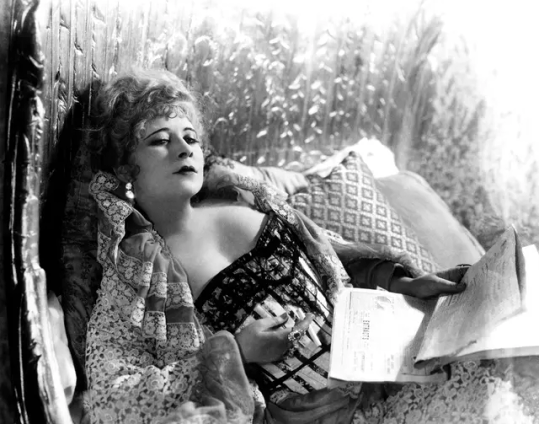
If you’ve seen Mae West on the stage in “Diamond Lil,” running eight months now, and tickets on sale for New Year’s Eve, or in “Sex,” which ran eleven months last year, you’ve probably pictured her as a large woman—a bit gross-looking. She’s neither large nor heavy, almost slight, except in personality. At that, she is probably the only woman in America who doesn’t want to look thin. She feels that curves are far more appealing than angles, and won’t accept photographs that do not show her a bit more voluptuous and rounded than the slim silhouette the modern woman has succeeded in making popular.
Mae West, who writes her own plays and then stars in them, is one hundred per cent good showman. Her showmanship is apparent always, natural, inborn. She may have added to it, learned a trick here and there, but her ability to put herself over and her delight in doing it is a trait that could not have been acquired.
Mae knows that a star still in the make-up of the play is far more interesting, even to those who know the theatre, than an overdressed little woman in street clothes. Her admirers come back to see her after the show, and for two hours after the final curtain Mae is in the costume of the bad lady of the nineties, wig and corset and tight-fitting gown. The gown is immensely becoming in spite of its grotesqueries. If the evening is warm she’ll take off a couple of outer garments as she laughs over the foibles of the day, adding comments in her husky, Brooklynese drawl, always the Little Queen.
“People want dirt in plays, so I give ‘em dirt. See? They can be dull at home, but in the theatre they want excitement. They want to feel, not think. Know what I mean?” . . . “Love, say, what I could tell you about that! But I would have to take a couple of days off to do the subject justice. Know what I mean?”
Critics, and writers on the lesser Broadway publications, old actors, and the rather smart crowd that likes to know the newest professional success, drop in for a glass of near-beer from the bar in the old-fashioned saloon right on the stage. They tell her how good she is and Mae is courteous, amused, always optimistic, glad to see everyone, dropping fairly good, though somewhat trite, epigrams, peppered with bad grammar and made important because of her drawl and her insinuations. She ends her sentences with “Know what I mean?” or “See?”—sometimes combining the two.
Mae West has little interest in anything outside the theatre. Her reading is confined usually to Variety or any occasional newspaper. She does not even know the names of important theatrical figures unless she has come into direct contact with them. The other night Ina Claire came to see “Diamond Lil.” When Mae West was told she was out front she said, “All right, bring her in. But who is she?”
Clubs and cards and outdoor activities do not amuse her. The things that interest most people are of the utmost indifference to her. She is a bit interested in the occult and in spiritualism, has attended a séance or two, and is “considering” attending others. Even on days when there are no matinées she goes to her dressing-room around two or three to plan her next play or think about some of the intricacies that are beginning to engulf her, that make life so much less simple than when she did a “strong act” or was a blues singer in vaudeville. She is most professional around the theatre, is very particular about lighting effects and about noises in front that might affect a big scene.
A handsome, middle-aged admirer or two can usually be seen around the theatre, keeping away unwelcome interviewers and making themselves generally useful. Sometimes there are other younger men in attendance. Mae says she’s not in love, and hopes she won’t fall in love for a while—until she has more time for it. Of course she’s always been interested in men, she’ll tell you. “Just infatuations, though. Know what I mean?”
Mae is secretive, almost to the point of mystery, about her family, her past—a curious secretiveness. Her success has made her a little afraid. Old acquaintances wouldn’t look her up if they didn’t want something—if she were a failure, now, would they?
Excepting the dates, however, the main events of Mae’s life are not entirely shrouded in mystery, but since her prosperity she is building up a very pleasant past, much as we all build up pasts when success overtakes us, smoothing out events here and there, adding glamour to those that were not glamorous, deleting where deletion seems necessary. She admits having a father, a mother, a brother, a sister. She is a bit vague about them. Her sister is Beverly Osborne, the girl in “Diamond Lil” who plays the young innocent who gets sent to South America. Beverly is married to a Russian, Count Treshatny. She was in vaudeville in songs and sketches until Mae’s success provided her with an opportunity on the legitimate stage. Mae’s brother has an automobile exchange. Of her father Mae says, “His name is Jack West—J. E. See? He used to be a prizefighter. He’s a doctor now, practicing medicine in Richmond Hill.” The Jewish publications claim Miss West as a member of their faith, but she says that her grandmother was a Copley and claims Harry Thaw as her relative. Her mother is a plain, comfortable, kindly woman. Mae’s age is one of her mysteries. The record at Blackwell’s Island shows that she was born in 1900, but there might be a mistake in the entry, of course.
Mae’s early days, she said, were spent in her rich grandmother’s home in Greenpoint. “In Greenpurnt. See?” Then the family moved to Bushwick Avenue near Linden Street.
Mae had very little formal education. She went to a Brooklyn public school until she was eight or ten. Then, with long blonde curls, she appeared at amateur nights. A darling, I’m sure, with some of the same personality and energy she has today. She did imitations of Eva Tanguay, George Cohan, Eddie Foy, and the others of the period who served best for mimicries.
So good was her act—or so attractive and forceful her personality—that she got all the prizes. This led to an engagement with Hal Clarendon’s Stock Company at the Gotham Theatre in East New York. Here she became a child actress, playing in “Uncle Tom’s Cabin” as Little Eva, in “Little Lord Fauntleroy,” “For Their Children’s Sake,” “The Three Courtiers,” “The Moonshiner’s Daughter,” and “East Lynne.” And when the bill didn’t call for a child actress she sang songs between the acts, in the olios. She sang “That ’Cello Melody,” “The Robert E. Lee,” “Barber Shop Chord,” “The Piano Man,” and “Oceana Roll.”
From the Clarendon Stock she went into vaudeville, the usual next step. She included weight-lifting in her act and she says she can still carry four men on her shoulders. Even then she was self-centred, a bit greedy for the spotlight, optimistic, eager for success, frank, amusing, calm, cold and warmhearted in turn.
Broadway became Mae-West-conscious when she was a vaudeville headliner. She was on the Keith circuit and played the Colonial, where she was the first to put on the shimmy. She achieved the Palace, too, and always had a good act. She always had her own accompanist—“So-and-So at the Piano.” She picked these accompanists because of their personality—and discovered half a dozen celebrities. Harry Richman, one of her discoveries, was sent to her among twenty pianists, and she picked him out “because of his personality.” His name was Reichman then. She couldn’t pronounce it.
“Do you mind changing your name?” she asked. “You’re not so prominent. Change it to Richman. It will be easier for me—and a better name for you, too.” Vincent Lopez was another whose talents she recognized at a tryout at Charles K. Harris’ office.
Jack Smith, at one time her pianist, was sure he couldn’t sing when she asked him to.
“Just whisper it,” said Mae. “It’ll get over all right.” He did whisper it, and became well known as Whispering Jack Smith. Another of Mae’s discoveries, Barry O’Neal, had had a small part in “The Dark Angel” until Mae made him her leading man.
When the shimmy went out Mae went on to Higher Things. In a Shubert revue, in a number called “Shakespeare’s Garden of Love,” she was elegant as Cleopatra. Earl Carroll wanted to star her.
She read plays, looking for a part she liked. Since she could find no suitable star parts for herself, Mae wrote “Sex.” People thought it vulgar, ridiculous, or funny, or a perfectly terrible play, laughed—and sent their friends to see the show.
When “Sex” had been running eleven months New York became strait-laced over night, and “The Captive,” “The Virgin Man,” and “Sex” were brought to task. The first two plays closed before the trial. Mae, however, stood trial, was sent to Welfare Island for twelve days, got a few hundred thousand dollars’ worth of free publicity, made friends with everyone on the place—and a few months later returned as a guest of honor, with a dozen clubwomen, who were putting on a publicity stunt for the Woman’s National Democratic Club and the Penology and Delinquency Division of the New York Federation of Women’s Clubs.
Then she wrote “Diamond Lil,” which became a hit instantly, one of the smart things to see.
Without Mae West, the play would be a faintly amusing caricature of a rough and interesting phase of American life, Chatham Square of thirty years ago—a rather tawdry melodrama. With Mae West it becomes important, amusing—curiously enough, almost a bit precious. She is slow, rhythmic, insinuating. She moves with almost feline intensity, a curious sort of wiggle, inside her corsets of the nineties. Her voice is low, husky, magnetic, and when she sings “Frankie and Johnnie,” carefully expurgated, it’s a big moment in the theatre.
There has been much pow-wow as to who actually wrote “Diamond Lil.” The program says “By Mae West, suggested by Mark Linder.” The real facts seem to be that Mr. Linder wrote a play concerning Chatham Square. Mae read it, found it had a masculine star rôle, and rewrote the play, using neither the situations nor the lines that Mr. Linder had used. She did use the setting and some of the plot.
When “Diamond Lil” closes, Mae will star in another of her plays, “Men,” which Carl Reed, who sponsored “Pleasure Man,” will produce.
Miss West writes her plays on bits of paper, sometimes between the acts of another play. Now she has taken to using a dictaphone.
“When all my notes are put together and typed I have a play. See? I put in the real stuff at rehearsal. Know what I mean? I let the actors write a lot of their own lines. I pick them out for types, and then let ’em talk. You can’t tell how lines will go over until you try them out on the stage. You have got to hit an audience hard, keep ’em interested every minute. If the action starts to get dull I lift a scene from another act and put it in. See? I sold my new play from the outline. I said, ‘You’ll have to judge this by my other plays. I can’t write the words until the rehearsals start in.’ ”
Mae’s eyes are large and as true a violet color as I’ve ever seen. Her skin is soft and fair. Her nostrils are wide, eager, trusting, her nose small, with a pert turn-up. Her mouth is a bit voluptuous, firm at the corners. She is seemingly frank, with a frankness that tells nothing. She is interested only in things that concern her, sieved through her own personality.
I have no idea how far Mae West will go, whether she will fade out to “that little place on Long Island” all good vaudeville people long for, or will write, year after year, hokum, melodramas, and sex thrillers to shock the worthies of the town, but I don’t think “Diamond Lil” is her last success. She is real, understandable, an interesting and amusing product of this generation—hard, clear-headed, a bit cynical, vulgar where her rôles call for vulgarity. I like her. She is afraid of a thousand little things, of people getting a hold on her, of grafts, of attacks because she has succeeded, and she has real courage.
“After ‘Sex,’ they wanted me to play a nun,” she said. “ ‘Show ’em you can be a good woman!’ they said. I did ‘Diamond Lil,’ just the opposite—gave people what they wanted. Once show people you’re afraid and you’re through. See?”
For a long time, then, Mae West won’t be through. Know what I mean? ♦
Published in the print edition of the November 10, 1928, issue, with the headline “Diamond Mae.”
3 notes
·
View notes
Text




MaXXXine's soundtrack is available on vinyl for $40 via A24. Expected to ship in September, it's pressed on Sparkly Red Carpet colored vinyl and housed in a die-cut jacket.
The 2xLP album includes the full score by Tyler Bates (X, Guardians of the Galaxy) plus songs by ZZ Top, Mary Jane Girls, Ratt, Animotion, John Parr, Frankie Goes to Hollywood, New Order, and Kim Carnes.
#maxxxine#mia goth#ti west#tyler bates#a24#vinyl#soundtrack#gift#zz top#mary jane girls#ratt#frankie goes to hollywood#new order#kim carnes#john parr#animotion
105 notes
·
View notes
Text
One thing which I really love about Catwoman is her independence, both from the Doylist and Watsonian perspective. From the Doylist perspective, her comics run has lasted over 300 issues. She's unique about superhero love interests in this - whom else can you name with a run this long? Not Lois, not Iris or Linda, definitely not Steve, and I'm going to guess that neither MJ, Black Cat, or Elektra either. I'm pretty sure that she even beats Batgirl, across runs for different characters with this mantle.
Don't get me wrong. I love BatCat. I want to see BatCat in more stories. But I don't want BatCat to be the end.
This is prompted by some of the reactions to the announcement of the run. I understand BatCat fans, but I also don't think that it would be sustainable to have a run, for Selina, that's about her relationship with Bruce.
Let her be independent, let her stories continue strong.
#batman#dc comics#dc#catwoman#selina kyle#comic books#comic book musings#i love catwoman#lois lane#iris west#linda west#steve trevor#mary jane watson#black cat#elektra#batcat#batgirl
24 notes
·
View notes
Text

It’s almost as if female characters are more than boobs and hips 😨😰😱
#horizon zero dawn#playstation#sony#twitter#dumb takes#atomic heart#mary jane#mary jane watson#spiderman#spiderman ps4#insomniac#the last of us#last of us#the last of us part 2#aloy#ellie last of us#hzd#hzd aloy#forbidden west
327 notes
·
View notes
Text


#marvel#marvel comics#marvel 616#mary jane watson#kate bishop#mj watson#hawkeye#jackpot#west coast avengers#young avengers#polls
74 notes
·
View notes
Text
Lois Lane and Superman. Mary Jane and Peter Parker. Juliet and Romeo. Iris and Barry. Padme and Anakin. Percy and Annabeth.
From all of the couples mentioned, I think the least toxic and more healthy one is Lois Lane and Superman.
The rest are toxic because too much dependency is not good for any relationship. But there are people who like it...well....everyone with your opinions, right?
Not only that, but in most of the relationships mentioned, the woman orders and the man only obeys. This is not correct either....well...at least Barry from the Flash TV show and Superman still argue with their wifes 😅🤣. I don't know about Peter....
#percy jackson#percy jackon and the olympians#anti annabeth chase#anti percabeth#annabeth chase#percy and annabeth#superman#lois lane#superman and lois#romeo and juliet#mary jane and peter parker#anakin and padme#anakin skywalker#padme amidala#barry and iris#barry allen#iris west#romeo montague#juliet capulet#mary jane parker#peter parker#couples#toxic relationship
16 notes
·
View notes
Text
got some new books at the library today 😈 hehehe
#I got mary Oliver essays#a John Keats poetry book love him!!#a book of Kurt Vonnegut speeches/essays#a journal/essay thing by an author I don’t know#eligible by Curtis sittenfield because I love Jane Austen and I needed a fun fiction read#and a collection of stories and essays by Raymond carver#oh and south and west by Joan didion#I’m very much in an essays/diaries/meditations on writing and reading type of mood lately#I still need to finish the three library books I got first though#I’m reading mystery and manners by Flannery O’Connor currently and then I need to read a novel by her#and her other collection of short stories i haven’t read yet#plus maybe I think there’s some of her letters in the anthology I got#and I also have a short book of Rilke that I need to get to#but I’m pretty sure these will all renew without an issue cuz I think I cant renew three times#anyway I’m ranting I just love the library#they have a perpetual book sale going on and I found a romance book by an author I’ve read before#and a local book about moon phases and regional lore I think? it looks cool#and christian got a book#I’m gonna try to read at least 50 pages a day at minimum#I’m on track to finish 6 books in July! my second most accomplished month this year#I can’t believe I read 12 books in january what was I on#tbf some of those were graphic novels and middle grade lit though#but still
2 notes
·
View notes
Text
five comfort characters, five tags
Bringing this to a new post because it was becoming a long cluttered-looking thread lol. Thanks @samabigailalan :)
This is gonna have to just be random and not a top five of all time list lol because there are too many and I’ve gotten comfort in different ways at so many different times from too many characters
The Doctor
Is it cheating to not specify which Doctor? Lol. Just the entire character. This has been one of my ultimate comfort characters for over a decade now. At this point I’ve kind of grown up being able to turn to the Doctor, any version, and feel better than I did. I still remember when Eleven was the current incarnation and I was a more-or-less housebound child (teen, really) struggling with the harsh beginnings of my chronic illness, and I would imagine the mad man in a box coming to rescue me from my pain and boredom. I’ve better learned now how to deal with my illness and get out of the house as much as I can but the Doctor, in all forms, has always remained a wonderful escape from everything.

Sarah Jane Smith
I’ve been rewatching some Sarah Jane Adventures and it’s taken me back about 10 years to when she was such a strong comfort character to me, so I have to say her right now. Such a specific and warm experience of feeling like having an extra mother. She’s still very dear to me.

Steven Taylor
Yes I’ve now said three Doctor Who characters lol. But I’ve had too many times over the years where I’ve put on a Steven serial when I felt like crap to not now say Steven. I just love this guy.

Sam Winchester
I wouldn’t be me if I didn’t include him lol. He also got me through an awful lot in those early days of my illness and Jared by extension with his Always Keep Fighting campaign. I don’t think about Supernatural as much anymore but Sam has always been and always will be an important part of me.

Nikolai Lantsov
The latest addition in a long line of comfort characters over the years. This dude sprang from nowhere and I’m never gonna be able to get rid of him, nor would I ever want to. Absolute sunshine angel of a man. His sweet golden glow is a balm to the soul.

No-pressure tagging @freakwiththeknifecollection @burnt-kloverfield @melliabee @faithfire-writes @junkyardbluebox
#collective shoutout to my many other babies who have comforted me in different ways over the years#man i remember when all i needed in this world was wally west from jlu#or mothering characters like beverly crusher or mary poppins or whoever else#or people i see myself in like spencer reid#so so many. i'd be here forever.#tag game#eleventh doctor#sarah jane smith#steven taylor#person: nothing i wouldn't do#nikolai lantsov
5 notes
·
View notes
Text
#positive mental attitude#motivation#california#west coast#mary jane#marijuana#indoor#lead cultivator#dope smoke#ganja#smoke weed everyday#Spotify
3 notes
·
View notes
Text
very iconic of petermj and wallylinda to be two of the strongest married comic couples in history with their love running so deep and pure that it pissed off and hurt the respective devils of their universe.
edit:
actually linda and wally are better than peter and mj because they manage to restore their marriage and kids in the main continuity with their love so strong it got the devil literally begging them to take it back from him because it was hurting him so much.
#marvel#dc#petermj#wallinda#peter parker#mary jane watson#wally west#linda park#okay now let’s bring back petermj marriage into 616 continuity#.txt
12 notes
·
View notes
Note
💖👻📊🍰
💖: What do you like most about your own writing?
My dialogue! I think it flows really well most of the time
👻: What is one WIP you think you may never pick back up?
Idk if I’m disappointing anyone by saying this, but…the Nina Shelley AU is probably never getting updated, sorry 😅 even when the new Ted Lasso season premieres, idk if I’ll be able to keep the muse alive for long. And I didn’t really have a plan for that AU anyway, so 🤷♀️
(Tbh I’ve always had a hard time writing fics for media I think is fantastic, with ATLA being the exception. Idk what that says about me 😂)
📊: Current number of WIPs
9! Tho 2 of them are from the same AU 😂
🍰: Name one of your fave comfort fics (doesn’t have to be your all time fave)
Three of them! (I couldn’t just pick one 😂 even narrowing it down to 3 was hard)
This fic (by the amazing @blondsak and @promiseofthepremise, with some amazing art by @klloggs) is just…idk why it’s a comfort fic but it just is! I absolutely love MCU MJ’s backstory in this, the complex mother-daughter-ness with her and Mary Jane, MJ’s amazing dad, the catharsis, just…all of it. It’s so good. Please read it
This Snowest AU by the amazing @fezwearingjellybananas, which got me to ship it in earnest (and has Thallen as a side-pairing) 🥰 as a bonus, they also wrote a fantastic Westhallen pirates fic that I adore!
…idk how exactly to describe this fic, but…think CK in Reddit form 😂 it’s hilarious and awesome and please read it! @bobakick, I love you for writing this 💞
fanfic ask game!
#lavi’s fic recs#fanfic ask game#marvel#mcu#mary jane watson#michelle jones watson#mj watson#spider man#the flash#caitlin snow#iris west#snowest#barry allen#eddie thawne#westhallen#thallen#cobra kai
12 notes
·
View notes
Text

Well, I did not know that a famous namesake of mine was actually a real person. Here is Mary Jane Cannery, better known as 'Calamity Jane'. According to Wikipedia, much of the information about the early years of Calamity Jane's life comes from an autobiographical booklet that she dictated in 1896 for publicity purposes, yet some of the information in the pamphlet is exaggerated or even completely inaccurate. What is known for certain is that she was an explorer, sharpshooter and a storyteller who toured with Buffalo Bill's Wild West show and nursed small pox victims later in life.
Wild Bill Hickok, the character played by Howard Keel in the Doris Day movie, was also a real life character and the Wikipedia biog describes him as "a folk hero of the American Old West known for his life on the frontier as a soldier, scout, lawman, cattle rustler, gunslinger, gambler, showman, and actor, and for his involvement in many famous gunfights." Busy guy! It is said that when he was murdered, Calamity Jane went after his killer with a meat cleaver, as she had left her guns at home.
1 note
·
View note
Text
Westward Ho The Wagons (1956)
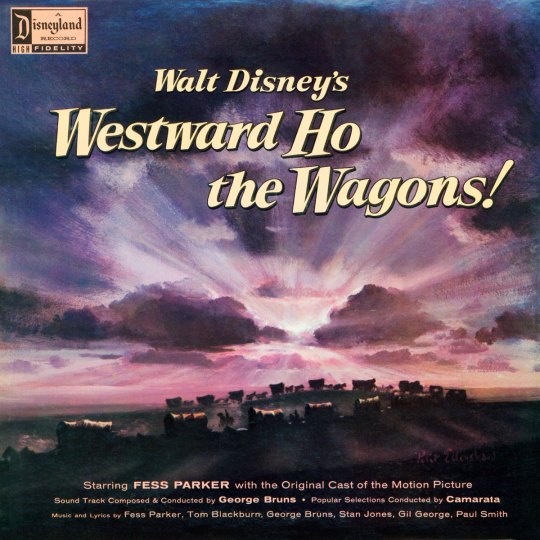
Children Of The Covered Wagon by Mary Jane Carr (1934)
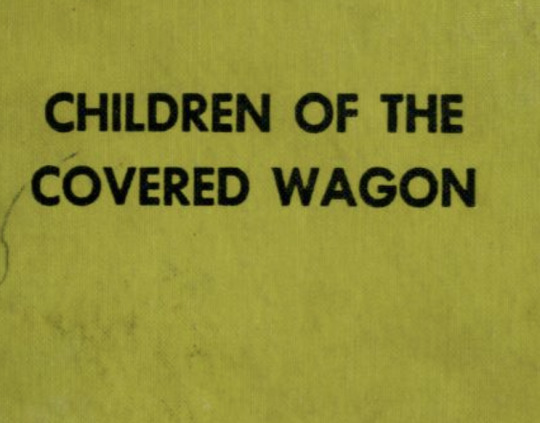
#Westward ho the wagons#Content warning#Children Of The Covered Wagon#Mary Jane carr#1934#Book#1956#Disney#Old west
1 note
·
View note
Text




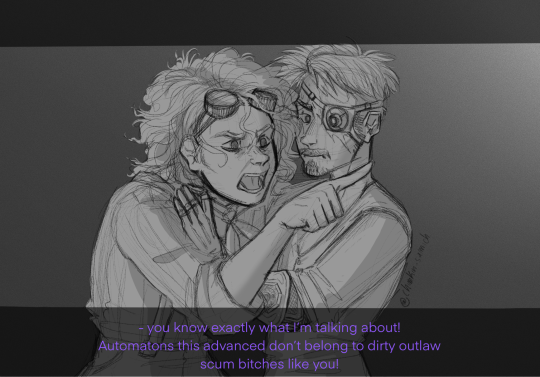


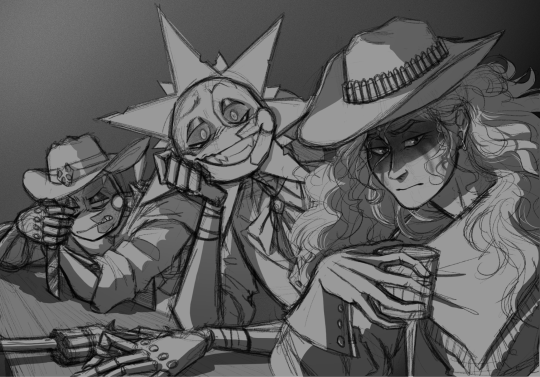
Wild West AU my beloved!
In order:
their first interaction (cause as we all know, she doesn't spare a glance to them on their actual first meeting)
Moon and The Lioness hiding while Sun baits their targets-
A little banter in the Saloon with some of The Lioness' old acquaintances , specialized in technology and quite flabbergasted to see such advanced automatons "in the hands of a criminal"
+ a little bonus under the cut
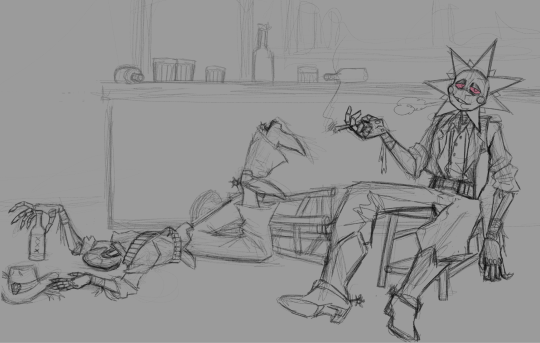
Did you know that apparently Mary Jane was much cheaper and used as a substitute for tobacco often in the wild west? I didn't either but I read that fact a few days ago and I couldn't stop thinking about it-
#arts#art#wild west au#dca x reader#dca fandom#dca au#dca sun#dca fnaf#dca moon#sundrop and moondrop x reader#sunrise and moondrop x reader#moondrop x reader#moondrop x self insert#moondrop x oc#moondrop x y/n#moondrop x you#sundrop x self insert#sundrop x reader#sundrop x oc#sundrop x y/n#sundrop x you
2K notes
·
View notes
Text
I feel like a lot of people forget that the Van Dir Linde gang was actually famous in their universe- Dutch Van Dir Linde was as famous as the real life Butch Cassidy. The gang had as much infamy as the Wild Bunch or the Dalton gang. Arthur Morgan, John Marston, Bill Williamson, Javier Esculla, Lenny Summers, Charles Smith, Sean McGuire and more were probably as famous as the real life Doc Holliday, Jesse James, Black Bart, Rufus Buck, Ike Clanton, the Sundance Kid, Wild Bill Hickock, and more.
Sadie Adler would've been just as famous. She was a gunslinger like the real life Calamity Jane and Anne Oakley and she was an outlaw at one point like Laura Bullion, Pearl Hart, Belle Star, The Cassidy Sisters, and more.
The other women of the camp would've probably been less popular but still very intriguing figures to people in the future.
In the newspapers, we see that there are songs about Dutch's boys and books too. Trelawny mentions them being on dime novels. In the future, the pieced together story of the Van Dir Linde gang might've gotten adapted into a movie, similar to "Butch Cassidy and the Sun Dance Kid" or "The Assassination of Jesse James by the Coward Robert Ford". They could've gotten biopics, documentaries, and more.
Historians and fans of the wild West era would dig up records, find pictures, and maybe even track down people who were apart of the gang, accomplices to the gang, or victims of the gang. They would try to piece together stories to figure out the mystery of what actually happened to the gang.
People would argue over things that happened in the gang and have their evidence to back it up. Letters written by gang members would become so valuable. If they ever someone come across Arthur's journal, it would probably be considered one of the most valuable pieces of documentation to ever exist for that time period.
The guns of the gang would probably be kept in museums if found. Albert Mason's portrait of Arthur Morgan would be found in history books, same as other pictures.
Dutch would probably be a very controversial figure in history- some would hail him as a failed hero and others would condemn his violence no matter the reason- they wouldn't know what the people in the gang knew- especially in the end. Same with the rest of the gang members.
They'd probably all get romanticized. Hosea and Dutch's friendship, the raising of the boys, Dutch and Annabelle and his fued with Colm, Mary and Arthur, John and his family, Javier being a revolutionary- no one would know the full story.
And then there is Jack- he may live to see the 1960s and 70s and 80s. He may have grandchildren who'd pull him into a theater to watch a retelling of the gang that he was a part of at one point. He'd be amused. He'd think that the actor playing his father was too clean looking, too pretty. He'd think that the movie Arthur was too skinny. He'd think that the man playing Dutch had a funny voice as he tried to mimic the accent. He'd laugh and make notes in his head of the historical accuracy. He'd feel sorrowful at the deaths of the characters- he knew them at some point. And no one at the theater would know that the old man with the rowdy bright eyed boys who brought him there was Jack Marston, the last of the Van Dir Linde gang.
Jack might talk about it to the public. He might do interviews. He might even write a book about his father, the infamous John Marston. Those would be priceless. Even Beecher's Hope might be kept around and visited as a historical site for history goers.
And honestly? It is such a bittersweet thing.
#rdr2#red dead redemption 2#red dead redemption#rdr#arthur morgan#john marston#dutch van der linde#sean maguire#lenny summers#javier escuella#bill williamson#sadie adler#susan grimshaw#tilly jackson#karen jones#mary beth gaskill#abigail marston#mary linton#jack marston#history#wild west#story analysis#character analysis#i love thinking about this so much#it makes me both super happy and super sad.
966 notes
·
View notes
